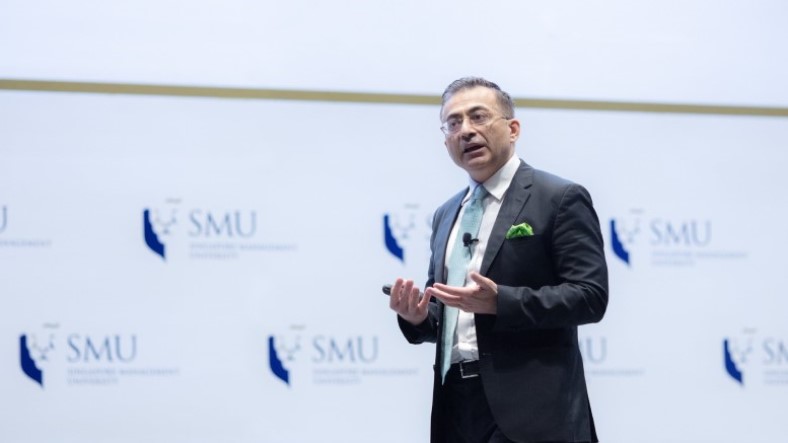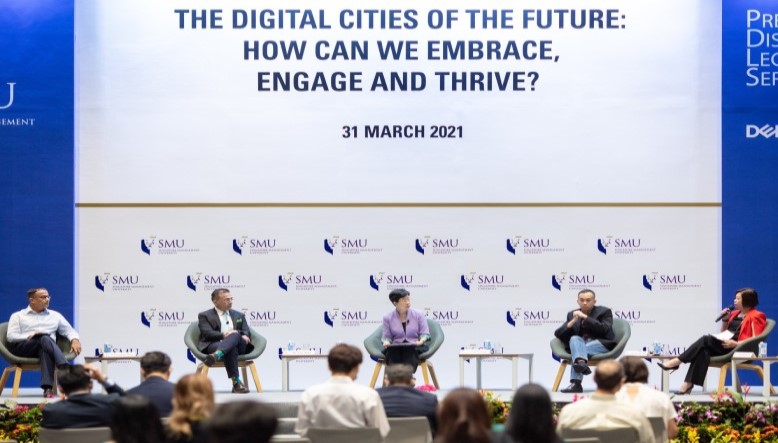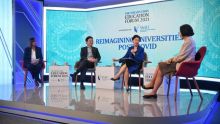Humanity and the power of choice: Key drivers for building cities of tomorrow

The Presidential Distinguished Lecturer Series returned to SMU’s School of Law auditorium earlier this year, and was hosted by President Professor Lily Kong, after a brief hiatus due to COVID-19 in 2020. Speaking from the podium on the topic The Digital Cities of the Future: How can we embrace, engage and thrive, was keynote speaker Mr Amit Midha, President of Asia Pacific & Japan and Global Digital Cities at Dell Technologies.
He shared his vision of the ‘City of the Future’ and the roadmap towards making this a reality.

With safe distancing in place, the audience included in-person as well as online viewers tuning in to the event that was broadcast live via Zoom. Close to 350 SMU students, staff and faculty, polytechnic and junior college students and teachers, as well as government and industry representatives, attended the hybrid event.
From change to opportunity
Cities have been the epicentre of innovation and economic growth throughout history. By 2050, urban areas are expected to be home to 68 per cent of the global population.
“Technology evolution has played a key role in this change, reshaping the company landscape over the last century,” said Mr Midha.
“The role of various economic sectors and the nature of work has been transforming with the penetration of Digital Technologies. Many of these transformative and disruptive changes are happening much faster than we think – catalysed by the convergence of key enabling factors. Embracing these transformations enables economies, companies, cities and individuals to thrive and grow, while the ones who choose not to, lose out.”
Next-generation digital technologies are becoming more pervasive and have the potential to transform the fundamental fabric of cities, and in turn deliver on key citizen outcomes: more efficient and inclusive services, more economic growth and opportunities, and a sustainable planet, thus driving better quality of life.
“Many global cities, for example, NEOM, Toyota’s Woven City, New York, Dubai, Singapore are pursuing transformative visions for their future,” added Mr Midha.
“The change towards the future needs to address issues such as intensifying urbanisation, the rise of the digital native generation, disruptive technology paradigms, need for re-inventing economic growth models and ability to deal with next-generation crises like climate change.”
This begs the question of how educators can prepare students to be such “digital citizens”. Youths today are the architects of tomorrow’s reality, and thus need to be equipped with the tools they need to create these envisioned cities of the future.
“A digital city cannot be built in silos,” explained Mr Midha.
“Given the complex, interconnected and dynamic nature of the urban ecosystem, the true value of this transformation is achieved only when the cities grow as an intelligent ‘system of systems’ that maximises the value of the data, which forms the core fabric of these cities of the future.”
He elaborated that the roadmap towards the future will be unique for each city and requires an agile and iterative transformation framework across its people, process and technology. Cities need to harness the right skillsets across technology, domain expertise and innovation, with the partnership between the public and private sectors as well as future citizens key to success.
“It is critical for cities to develop an agile mindset and approach that enables them to pursue an outcome-focused, iterative approach towards this vision for the future. The technology approach needs to be modern, modular, secure, open and scalable.”
Bearing this in mind, a core focus on education to instil a continuous learning mindset is critical, in order to prepare the next generation for the task of building and adapting to the skills of the future.
Mr Midha said, “As an individual or student, the choice to play the role of a ‘builder’ or that of an ‘operator/manager’ is key to identifying the right skill sets one needs to invest in. The disruptive outcomes of the future can only happen when technology integrates with core domain expertise.”
The point was elaborated upon when Mr Midha was joined by Mr Tan Kok Yam, Deputy Secretary, Smart Nation and DigitalGovernment and Strategy Group, Prime Minister’s Office; Ms Julienne Loh, Executive Vice President of Enterprise Partnerships (Asia Pacific), Mastercard; Professor Archan Misra, Vice Provost (Research), SMU, for a panel session moderated by Prof Kong.
Prof Kong had addressed the panel and posed the question of what part individuals may play in the making of a smart city, when governments and corporations are the major drivers in this digital evolution?
“The role of the citizen is to be embracing (of innovation) and to generate data,” replied Prof Archan.
“By including citizens in designing technology, they can then contribute towards its governance. It is about empowering individuals to realise that their actions have consequences. Take the National Steps Challenge for instance; that made everyone sign up because of perks.”
On an optimistic note, Mr Mehta added that it is this human connection that matters most, even in an age of machine learning to finetune our living environment, saying: “Do I anticipate a Dystopian society? Let’s hope not. The future we want must be created by us.”



